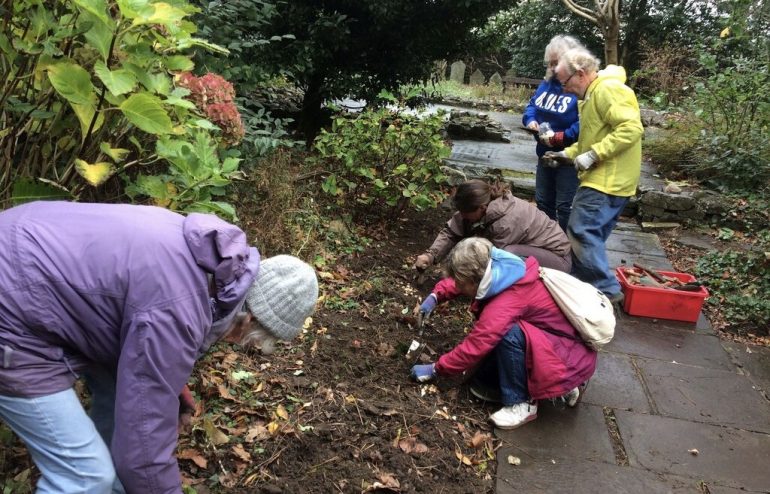Hive-minded citizens unite to plant 11,000 wildflower bulbs to encourage pollinators
VOLUNTEERS, residents and council staff have come together to plant 11,000 bulbs across Cardiff to support bees and other pollinators.
Organisers hope that by encouraging biodiversity the bulbs will help achieve a sustainable and healthy population of bees across the city.
There has been a 60% decrease in the number of bees in the past 20 years. People are being encouraged to plant a variety of wildflowers to ensure these numbers don’t decline further.
Bulb planting events have been held at Bute Park; Jellicoe Gardens, Cyncoed; Forest Farm, St Mary’s Gardens, Whitchurch and Littleton Street, Riverside to help keep Cardiff in bloom.
The bulbs were funded by the Cardiff Pollinator Project supported by the Cardiff Local Nature Partnership and Welsh Government’s Local Places for Nature scheme.
Samantha Eaves, Cardiff Local Nature Partnership coordinator, said: “UK native bluebells, wild garlic, tulips and snowdrops are among some of the bulbs that have been planted to provide an early spring nectar source for pollinating insects and bring an extra splash of colour to our parks and green spaces.”
This scheme is part of a government strategy Plan for Pollinators in Wales which aims to reverse the decline of biodiversity.
Vice-chair of Cardiff Civic Society Julia Barrell said: “It’s great to hear these native wild flower bulbs are being planted around Cardiff. They will help pollinators – especially the early flowering plants, which are really important for bees when there may not be much else available.
“Hopefully, there will be other flowers nearby to provide pollen and nectar for them in the summer and autumn.”
Cardiff Cabinet Member for Culture and Leisure, Peter Bradbury, said: “One of our aims is to grow and manage our green spaces in Cardiff which will help create new habitats to support nature.
“These bulbs will burst into life in spring, traditionally seen as a time for new beginnings, these flowers will provide a lot of joy to the local communities and benefit wildlife as the seasons change after these long, winter months.
“This is a fantastic community project, it’s great to see so many people working together.”
Scientists at Cardiff University have also been playing a role in encouraging the growth of the bee population.
Professor Les Baillie and his team are working with partners including the National Botanic Garden of Wales, St David’s Shopping Centre, Pollen8 Cymru, Wyevale Garden Centres, Cardiff University Schools Partnership funded by RCUK, and schools across Cardiff to plant bee-friendly flowers across south Wales.
Working with the University’s Community Gateway project in Grangetown, his team have planted bee-friendly flowers in the grounds of Grange Pavilion.
Professor Baillie said: “We need to increase the number of people that become beekeepers or encourage people to grow plants that will encourage the bees.
“The majority of the crops that produce our food need bees to spread pollen from one plant to another. Without that we have no food, so they are very important to us.”
Community groups in Cardiff are invited to apply for plants, seeds, tools, and equipment up to a value of £500 for projects to protect and enhance biodiversity.
- For more information or an application form, contact Samantha Eaves via email at biodiversity.team@cardiff.gov.uk.



